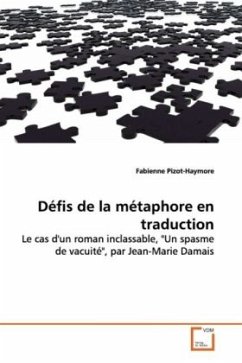
"Cabaret" in Translation
Translation, Politics, the Actor
Versandkostenfrei!
Versandfertig in 6-10 Tagen
32,99 €
inkl. MwSt.

PAYBACK Punkte
16 °P sammeln!
This book is dedicated to theater translation. Itdiscusses the relationship between the translatedtext and the final production and the similaritieswhich exist between the tasks of the translator andthe actor in the process of creation of the theatertext and the final production. This perspective hasnot been foregrounded sufficiently in TranslationStudies and needs to be better integrated. Thetranslator s/actor s erudition, project and horizonand the perception of the target audience oftendictate changes performed in the theater text, whichcan reflect the political and social situation of thet...
This book is dedicated to theater translation. It
discusses the relationship between the translated
text and the final production and the similarities
which exist between the tasks of the translator and
the actor in the process of creation of the theater
text and the final production. This perspective has
not been foregrounded sufficiently in Translation
Studies and needs to be better integrated. The
translator s/actor s erudition, project and horizon
and the perception of the target audience often
dictate changes performed in the theater text, which
can reflect the political and social situation of the
target society. This book proposes to compare the
tasks of the theater translator and the actor based
on the similarity of the key elements of their
mission: interpretation and mediation. Using the
example of different interpretations of the musical
«Cabaret» it demonstrates the importance of the
interaction between the translator and the actor.
discusses the relationship between the translated
text and the final production and the similarities
which exist between the tasks of the translator and
the actor in the process of creation of the theater
text and the final production. This perspective has
not been foregrounded sufficiently in Translation
Studies and needs to be better integrated. The
translator s/actor s erudition, project and horizon
and the perception of the target audience often
dictate changes performed in the theater text, which
can reflect the political and social situation of the
target society. This book proposes to compare the
tasks of the theater translator and the actor based
on the similarity of the key elements of their
mission: interpretation and mediation. Using the
example of different interpretations of the musical
«Cabaret» it demonstrates the importance of the
interaction between the translator and the actor.












